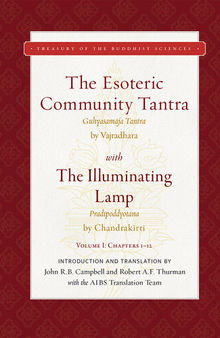دانلود کتاب The Esoteric Community Tantra, The All-Tathagata Body-Speech-Mind Secret, The Great Tantra King (Sarvatathāgatakāyavākcittarahasya-guhyasamāja-nāma-mahātantrarāja) with The Illuminating Lamp: An Extensive Six Parameter Explanation (Ṣatkotivyākhyā-Pradīpoddyotana-nāma-ṭīkā) - Volume I: Chapters 1-12
by Great Vajradhara, Chandrakirti, John R.B. Campbell, Robert A.F. Thurman, Shrikant Bahulkar, David Mellins, Paul G. Hackett, Thomas F. Yarnall, AIBS Translation Team|
|
عنوان فارسی: جامعه باطنی تانترا، راز بدن-گفتار-ذهن تمام تاتاگاتا، پادشاه بزرگ تانترا (Sarvatathāgatakāyavākcittarahasya-guhyasamāja-nāma-mahātantrarāja) با لامپ روشنگر: یک توضیح گسترده شش پارامتری |
 دانلود کتاب
دانلود کتاب
 جزییات کتاب
جزییات کتاب
A new presentation of Tantra with its most renowned commentary by one of the foremost translator/scholar teams of Indian and Tibetan Buddhism.
This volume is a translation of the first twelve chapters of The Glorious Esoteric Community Great King of Tantras (Sri Guhyasamaja Maha-tantra-raja), along with the commentary called The Illuminating Lamp (Pradipoddyotana-nama-tika), a commentary in Sanskrit on this tantra by the seventh-century Buddhist intellectual and tantric scholar-adept Chandrakirti. Regarded by Indo-Tibetan tradition as the esoteric scripture wherein the Buddha revealed in greatest detail the actual psycho-physical process of his enlightenment, The Esoteric Community Tantra is a preeminent text of the class of scriptures known to Indian Buddhist scholar-adepts as great yoga tantra, and later to their Tibetan successors as unexcelled yoga tantra. The Illuminating Lamp presents a system of interpretive guidelines according to which the cryptic meanings of all tantras might be extracted in order to engage the ritual and yogic practices taught therein. Applying its interpretive strategies to the text of The Esoteric Community Tantra, The Illuminating Lamp articulates a synthetic, “vajra vehicle” (vajrayana) discourse that locates tantric practices and ideals squarely within the cosmological and institutional frameworks of exoteric Mahayana Buddhism.
Review
“The Treasury of the Buddhist Sciences series stands out as one of the most important translation projects of the immense heritage of Indic religions and philosophies. This volume, with the English translation from Sanskrit and Tibetan of the fundamental Guhyasamajatantra and its pivotal commentary, the Pradipoddyottana, offers the reader another precious contribution of the series to the knowledge of Buddhist wisdom.” (Giacomella Orofino, University of Naples )
“The field of tantric studies is still in its infancy, with the large number of important works that remain unedited, untranslated, and unstudied. With this translation of the first twelve chapters of the Guhyasamaja Tantra with Chandrakirti’s commentary, Campbell and Thurman are casting a bright light on one of the most influential Buddhist tantras, as elucidated by Chandrakirti, one of the great Indian exegetes on this work. Campbell’s introduction nicely explicates the Buddhist hermeneutical project, while Thurman unveils a critique of Western misunderstandings of tantra and shows how Chandrakirti’s explanations can be a corrective. The translation is eloquent and seems very sound; the fruit of decades of intensive textual labor. I strongly recommend this volume for anyone interested in understanding the Buddhist tantras and their interpretation, and I look forward to the publication of the second volume.” (David B. Gray, Santa Clara University )
“This translation will be of great benefit to everyone intent on delving into the theory and practice of this tantric cycle as well as into the principles of the ground and path of the Vajrayana in general. The extensive introductions by Campbell and Thurman contextualize the Guhyasamaja and Candrakirti’s commentary from broader historical and doctrinal perspectives and challenge some of the persisting, bias-based, interpretative approaches to the Vajrayana.” (Vesna Wallace, University of California, Santa Barbara )
About the Authors
Robert Thurman is the Jey Tsong Khapa Professor Emeritus of Indo-Tibetan Buddhist Studies at Columbia University. After his education at Phillips Exeter and Harvard, he studied Tibet and Tibetan Buddhism for fifty years as a personal student of His Holiness the Dalai Lama. He has written both scholarly and popular books, and has lectured widely all over the world. As president of the American Institute of Buddhist Studies, he convened the first “inner science” conference with His Holiness the Dalai Lama at Amherst College in 1984. He is also founding trustee and president of Tibet House US, and co-founder of Tibet House’s Menla retreat center in the Catskills. Recipient of the president of India’s Padma Shri award, he has dedicated his recent efforts to translate into English the unique Tibetan treasures of ancient Indic scientific and spiritual resources in order to heighten the scholarly and general awareness of India’s ancient Sanskrit Buddhist heritage.
John Campbell, PhD, is an independent scholar, accomplished yogin, and translator of Sanskrit and Tibetan texts. His main areas of research are practice systems of yoga and tantra in Indo-Tibetan Buddhism and Hinduism. He is currently writing a book on the commentarial literature of Buddhist and Hindu tantric Buddhist practice systems in late first-millennium India. A former assistant professor of Buddhist studies at the University of Virginia, Charlottesville, among other academic institutions, he teaches graduate and undergraduate courses in the theory and practice of yoga (both contemporary and premodern), Buddhist philosophy in India and Tibet, and surveys of culture and religion in South, East, and Himalayan Asia. He is currently the director of Sanskrit projects for the Asian Classics Input Project, developing the digitization of classical Sanskrit texts on Buddhist and Hindu spiritual sciences. He also advises the research of advanced graduate students in UVA’s renowned Buddhist studies doctoral program.









 این کتاب رو مطالعه کردید؟ نظر شما چیست؟
این کتاب رو مطالعه کردید؟ نظر شما چیست؟
